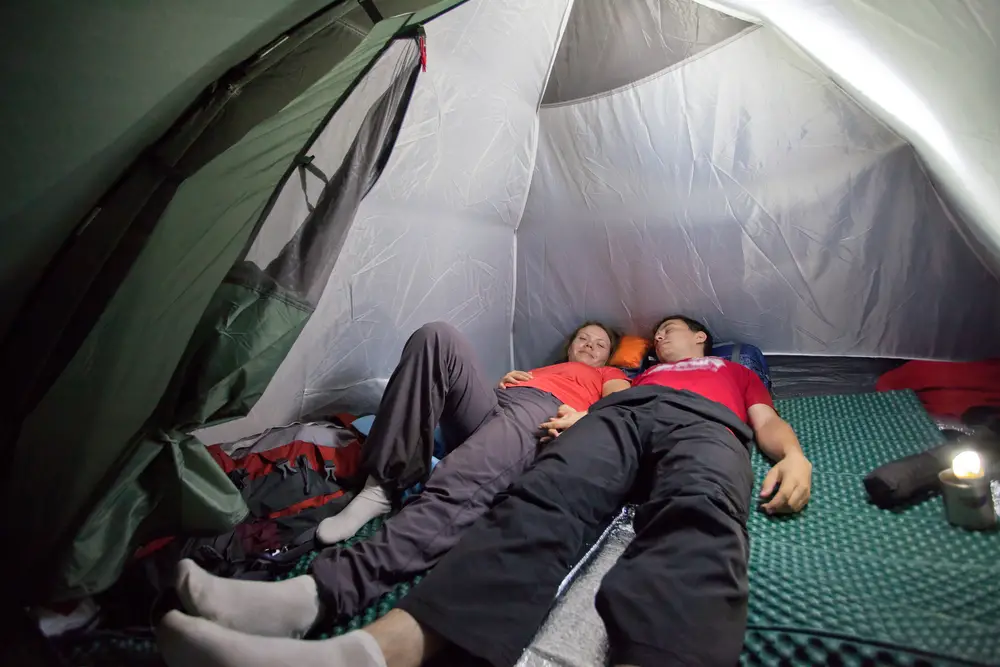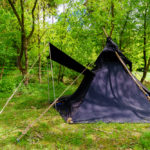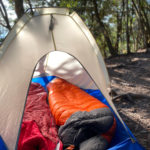For irregular campers, getting a good night's sleep inside a tent may seem like a challenge. Just because you are sleeping outdoors doesn't mean that you have to sacrifice a comfortable night's sleep.
The quality of your sleeping gear will greatly influence how well you sleep. Of course, you will need a sleeping pad, a camping mattress, or an air bed along with a sleeping bag and pillow.
Attempting to sleep without a comfortable surface to rest your head will impact the quality of your sleep. Also warm yourself up before getting into bed because trying to sleep when you are struggling to keep warm will be quite difficult.

It is important to prepare for condensation by opening the vents. This will encourage the circulation of air to prevent water vapor from building up overnight and causing your bedding and belongings to get wet.
For those who are easily woken and disturbed by noises as they sleep earplugs will prove invaluable by blocking out these distractions.
There are a few steps that can be followed to ensure that you enjoy a full, comfortable night’s sleep. Avoid stressing about not being able to sleep because this is going to heighten the likeliness of you struggling to do so.
Table of Contents
How do you sleep in a tent without a sleeping bag?
When packing for a camping trip, many would consider a sleeping bag to be a valuable piece of gear, however, it is possible to sleep inside a tent without one.
Some avid campers prefer to camp without a sleeping bag because they can be quite restricting and also consume quite a lot of space inside your backpack.
There are alternatives to sleeping bags available that are just as comfortable and effective in retaining heat. These alternatives include sleeping bag liners, camping blankets, throws, or a duvet.
Each will provide an additional layer of warmth and are compact enough to find inside your backpack along with your other gear. It is also worth layering up in extra clothes and thermals.
For some, this may be enough to keep them warm without a camping blanket or liner, etc, however, those who feel the cold quickly may find it more beneficial to use a bed liner or blanket whilst wearing multiple layers of clothing too.
Pack more than one blanket because you can then layer yourself with more than one if you feel necessary.
Also, consider insulating the floor of the tent as this will keep the heat inside and will prevent the cold from the ground from entering.
Choose the appropriate-sized tent as a large tent that is occupied by fewer people will be colder than a compactly sized tent.
What is the most comfortable way to sleep in a tent?
After spending the day exploring your surroundings, you want to enjoy a comfortable night’s sleep. For some, particularly irregular campers, sleeping comfortably outdoors may seem unachievable.
However, it is possible so long as you are prepared with the best sleeping equipment. The layer that separates you from the surface of your tent will influence your comfort.
Do not compromise on quality when selecting your camping mat, air bed, or mattress. The firmness of your air bed or mattress's surface can differ so it is important to select the option that caters to your preferences.
If you are camping in the cold you will need to cover the mattress or air bed to ensure that you aren’t sleeping directly on a cold surface.
Also, before pitching your tent, check that the area is free from stones or any other objects that may affect the smoothness of the surface and ensure that your bed is angled so that your head will be in an upright position as you sleep.
If you are surrounded by fellow campers, it is important to prepare for possible noise disruption.
Depending on the location in which you choose to camp, you will likely find that the temperatures drop throughout the night so packing thermals and additional layers will ensure that you don’t develop a chill.
Is it dangerous to sleep in a tent?
Sleeping in a tent has more dangers than sleeping inside a house and this is due to the nature of sleeping outdoors. There is a risk that you may encounter animals or insects and you may also be confronted with adverse weather conditions.
So long as you follow the necessary precautions and prepare for all eventualities, sleeping in a tent needn’t be dangerous. Before setting off on your trip, check the weather so you know what to expect.
Plan beforehand to ensure that you select a safe location that doesn’t invade the territory of animals and wildlife.
You may also wish to park your car near your pitch because if at any point you feel uneasy, you don’t have to trek a distance.
- Are Merrell Shoes Good? – An Unbiased Review of Merrell Footwear - December 9, 2023
- Where Are Merrell Shoes Made? - December 9, 2023
- Camping in 40-degree Weather: Tips and Tricks - September 25, 2023


![How to Sleep Outside Without a Tent? [For Beginners] How to Sleep Outside Without a Tent? [For Beginners]](https://grandcircletrails.com/wp-content/uploads/2022/05/How-to-Sleep-Outside-Without-a-Tent-150x150.jpg)



